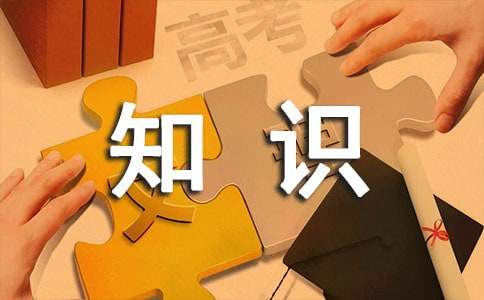高中英語知識(shí)要點(diǎn)全面總結(jié)
如何學(xué)習(xí)高中英語?很多學(xué)生都反映英語難學(xué),堅(jiān)持多聽、多讀、多說、多寫,英語成績(jī)自會(huì)有所提高。下面是百分網(wǎng)小編為大家整理的高中英語知識(shí)要點(diǎn)歸納,希望對(duì)大家有用!

高中英語知識(shí)要點(diǎn)
一般將來時(shí)
1) shall用于第一人稱,常被will 所代替。will 在陳述句中用于各人稱,在征求意見時(shí)常用于第二人稱。
例如: Which paragraph shall I read first? 我先讀哪一段呢? Will you be at home at seven this evening? 今晚七點(diǎn)回家好嗎?
2) be going to +不定式,表示將來。
a. 主語的意圖,即將做某事。例如:What are you going to do tomorrow? 明天打算作什么呢?
b. 計(jì)劃,安排要發(fā)生的事。例如:The play is going to be produced next month。這出戲下月開播。
c. 有跡象要發(fā)生的事。例如:Look at the dark clouds, there is going to be a storm. 看那烏云,快要下雨了。
3) be +不定式表將來,按計(jì)劃或正式安排將發(fā)生的事。
例如: We are to discuss the report next Saturday.我們下星期六討論這份報(bào)告。
4) be about to +不定式,意為馬上做某事。
例如: He is about to leave for Beijing. 他馬上要去北京。
注意:be about to do 不能與tomorrow, next week 等表示明確將來時(shí)的時(shí)間狀語連用。
5 be going to / will 用于條件句時(shí),be going to表將來,will表意愿。
例如: If you are going to make a journey, you'd better get ready for it as soon as possible.
Now if you will take off your clothes, we will fit the new clothes on you in front of the mirror.
6 be to和be going to be to 表示客觀安排或受人指示而做某事,be going to 表示主觀的打算或計(jì)劃。
例如: I am to play football tomorrow afternoon. 明天下午我去踢球。(客觀安排) I'm going to play football tomorrow afternoon. 明天下午我想去踢球。(主觀安排)
高中英語語法知識(shí)
一、過去將來完成時(shí)
1.概念:表示在過去某一時(shí)間對(duì)將來某一時(shí)刻以前所會(huì)發(fā)生的動(dòng)作,常用在虛擬語氣中,表示與過去的事實(shí)相反。2.基本結(jié)構(gòu):should/would have done sth.
3.例句:I thought you'd have left by this time.我想這會(huì)兒你已經(jīng)走了。
He told them he would have finished it by 8 o'clock.他告訴他們他會(huì)在8點(diǎn)以前干完。
二、 現(xiàn)在完成進(jìn)行時(shí)
1.概念:表示從過去某一時(shí)間開始一直延續(xù)到現(xiàn)在的動(dòng)作。這一動(dòng)作可能剛剛開始,也可能仍在繼續(xù),并可能延續(xù)到將來。
2.基本結(jié)構(gòu):主語+have/has +been +doing+其它
3.時(shí)間狀語:since+時(shí)間點(diǎn),for+時(shí)間段等。
4.例子:I have been sitting here for an hour.我已經(jīng)在這里坐了一個(gè)小時(shí)。
The children have been watching TV since six o'clock.從6點(diǎn)起,孩子們一直看電視。
三、 過去完成進(jìn)行時(shí)
1.概念:表示某個(gè)正在進(jìn)行的動(dòng)作或狀態(tài),持續(xù)到過去某個(gè)時(shí)刻,還未完成,一直持續(xù)到之后的當(dāng)前才結(jié)束。
2.基本結(jié)構(gòu):主語+ had + been + doing +其它
3.例子:She had been suffering from a bad cold when she took the exam.她在考試之前一直患重感冒。 Had they been expecting the news for some time?他們期待這個(gè)消息有一段時(shí)間了吧?
4.特殊含義:①尚未完成:He had been writing the novel.他已經(jīng)在寫小說了。(他沒寫完)
②企圖:He had been studying the meaning of this proverb.他曾經(jīng)學(xué)習(xí)過這個(gè)諺語。(他曾努力學(xué)習(xí)過它) ③未得結(jié)果:We had been studying what our enemy had said.我們一直致力于敵人所說的`。(但是我們沒有理解) ④最近情況:He had been quarrelling with his wife.他和他的妻子吵了一場(chǎng)架。(最近)
⑤反復(fù)動(dòng)作:He had been asking me the same question.他一直問我相同的問題。(屢次)
⑥情緒:What had he been doing?他做了什么?(不耐煩)
高中英語知識(shí)
一、讓步狀語從句
由下列連詞引導(dǎo):although, though, as, even if, even though ,while, whether…or, whoever, whatever, however, no matter+疑問詞等。注意以下幾點(diǎn):
1) although, though引導(dǎo)讓步狀語從句時(shí),主句前不能用but,但可以加yet, still。 Though it was raining hard, yet they didn’t stop working. 盡管下著大雨,他們?nèi)匀辉诠ぷ鳌?/p>
2) as引導(dǎo)讓步狀語從句時(shí),必須用前置結(jié)構(gòu),通常是從句中的表語、狀語或動(dòng)詞原形放在句首,放在句首的名詞前的冠詞要去掉。
Though he is a child, he knows a lot.=Child as(though)he is, he knows a lot.(在child前不要用冠詞)
Good as he is , he won’t be top of class.
Though I like it very much, I won’t buy it.=Much as I like it, I won’t buy it.
Try as he would, he couldn’t lift the heavy box.
3) whether ---or (not ) 引導(dǎo)的從句,提供兩個(gè)對(duì)比的“盡管”情況, 含有條件意味。 (Whether you) believe it or not, it is true. 信不信由你, 這是真的。
Whether you come here or we go there , the topic of discussion will remain unchanged.
4) 疑問詞+ever=no matter +疑問詞
Whoever you are, you must show your pass. 無論你是誰,你都必須出示你的通行證。 Whenever you come, you are welcome. 無論你啥時(shí)來,都?xì)g迎。
二、方式狀語從句
由下列連詞引導(dǎo):as, as if, as though ,the way等。
At Rome we must do as the Romans (do). 入鄉(xiāng)隨俗
Do it the way you were told (to). 教你怎樣做就怎樣做。
【高中英語知識(shí)要點(diǎn)全面總結(jié)】相關(guān)文章:
初中政治知識(shí)要點(diǎn)全面總結(jié)12-04
初中化學(xué)知識(shí)要點(diǎn)全面總結(jié)12-05
高中英語知識(shí)要點(diǎn)歸納總結(jié)10-30
高中英語必備知識(shí)要點(diǎn)總結(jié)10-30
高中英語知識(shí)要點(diǎn)總結(jié)大全07-20
高中生物知識(shí)要點(diǎn)全面總結(jié)12-05
高中英語必修四知識(shí)要點(diǎn)總結(jié)10-26